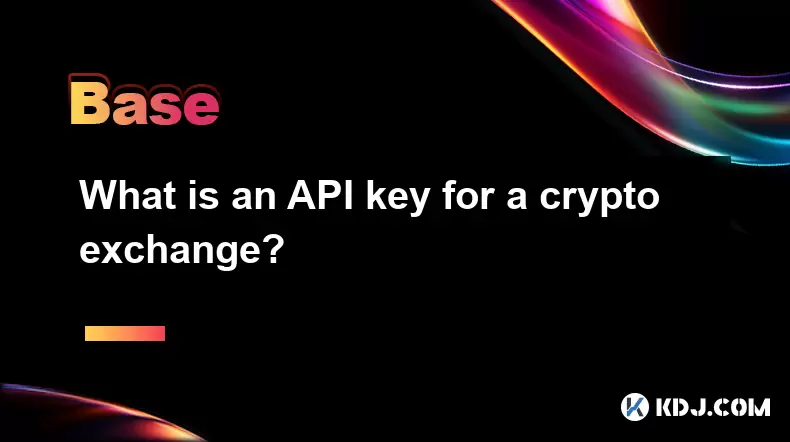-
 bitcoin
bitcoin $87959.907984 USD
1.34% -
 ethereum
ethereum $2920.497338 USD
3.04% -
 tether
tether $0.999775 USD
0.00% -
 xrp
xrp $2.237324 USD
8.12% -
 bnb
bnb $860.243768 USD
0.90% -
 solana
solana $138.089498 USD
5.43% -
 usd-coin
usd-coin $0.999807 USD
0.01% -
 tron
tron $0.272801 USD
-1.53% -
 dogecoin
dogecoin $0.150904 USD
2.96% -
 cardano
cardano $0.421635 USD
1.97% -
 hyperliquid
hyperliquid $32.152445 USD
2.23% -
 bitcoin-cash
bitcoin-cash $533.301069 USD
-1.94% -
 chainlink
chainlink $12.953417 USD
2.68% -
 unus-sed-leo
unus-sed-leo $9.535951 USD
0.73% -
 zcash
zcash $521.483386 USD
-2.87%
What is an API key for a crypto exchange?
An API key acts as a digital passport, enabling secure programmatic access to crypto exchange functions like trading and data retrieval.
Jul 04, 2025 at 04:36 pm

Understanding the Role of an API Key in Crypto Exchanges
An API key, or Application Programming Interface key, is a unique identifier used to authenticate requests made to a crypto exchange's server. It acts as a digital passport that allows users or applications to interact with the exchange programmatically. This means traders can automate trading strategies, access real-time market data, and manage their portfolios without manually logging into the platform.
The primary purpose of an API key is to grant controlled access to specific functions on the exchange. Depending on the permissions assigned during its creation, an API key may allow actions such as placing trades, checking account balances, or fetching historical trade data.
Important:
Each API key is tied to a specific user account and should be treated like a password due to its sensitive nature.
How to Generate an API Key on a Crypto Exchange
Most crypto exchanges provide a straightforward process for generating API keys within the user’s account settings. Here are the general steps:
- Navigate to your account settings or security section.
- Locate the API management panel.
- Click on the option to create a new API key.
- Assign appropriate permissions (e.g., read-only, trading, withdrawal).
- Confirm the action using two-factor authentication (2FA) if enabled.
- Store both the API key and secret securely—these will not be shown again.
Some platforms also offer IP whitelisting features to enhance security by restricting API access to trusted IP addresses only.
Different Types of Permissions Associated with API Keys
Crypto exchanges typically offer multiple levels of permissions when creating an API key. These include:
- Read-only access: Allows viewing account information and market data but does not permit any transactional activity.
- Trading access: Enables placing and canceling orders but does not allow withdrawals.
- Withdrawal access: Grants full control over funds, including the ability to transfer assets out of the exchange.
It is crucial to limit permissions based on the intended use of the API key. For example, if you're using third-party trading software, it's safer to enable trading access without withdrawal capabilities.
Security Best Practices When Using API Keys
Because API keys provide direct access to your exchange account, they must be handled with care. Here are some best practices:
- Never share your API keys publicly or store them in insecure environments.
- Regularly rotate or regenerate API keys, especially after ending a service or suspecting a breach.
- Use strong encryption methods when storing API credentials in local or cloud storage.
- Enable IP whitelisting whenever possible to restrict unauthorized access attempts.
- Monitor API usage logs provided by the exchange to detect suspicious activities.
Many advanced traders and institutional investors use hardware wallets or secure API gateways to further protect their keys from potential breaches.
Common Use Cases for API Keys in Cryptocurrency Trading
API keys serve various purposes beyond basic trading automation. Some of the most common use cases include:
- Automated trading bots: Traders use API keys to connect their accounts with algorithmic trading systems that execute trades based on predefined strategies.
- Portfolio tracking tools: Third-party apps like CoinMarketCap or CoinGecko often require API keys to fetch accurate balance and performance data.
- Data analysis and reporting: Developers and analysts pull historical and live market data through APIs for research or visualization purposes.
- Multi-exchange arbitrage: Sophisticated traders leverage API keys across multiple exchanges to exploit price differences in real time.
Each use case demands careful configuration of API permissions and frequent monitoring to ensure account safety.
Frequently Asked Questions About API Keys for Crypto Exchanges
1. Can I have multiple API keys for the same exchange account?Yes, most exchanges allow users to generate multiple API keys with different permission sets. This helps compartmentalize access for various services or tools.
2. What happens if my API key gets compromised?If you suspect your API key has been exposed, immediately revoke it from your account settings and generate a new one. Most exchanges offer a feature to deactivate old keys instantly.
3. Do all crypto exchanges support API access?While most major exchanges offer robust API support, smaller or newer platforms might have limited or no API functionality. Always check the exchange’s documentation before relying on API integration.
4. Is it safe to use third-party apps that request API keys?Only provide API keys to trusted and verified applications. Always review the permissions requested and consider using read-only or trading-only access instead of full withdrawal rights.
Disclaimer:info@kdj.com
The information provided is not trading advice. kdj.com does not assume any responsibility for any investments made based on the information provided in this article. Cryptocurrencies are highly volatile and it is highly recommended that you invest with caution after thorough research!
If you believe that the content used on this website infringes your copyright, please contact us immediately (info@kdj.com) and we will delete it promptly.
- Woof, There It Is: Dogecoin, Meme Culture, and the High-Stakes Opportunity
- 2026-02-19 07:10:01
- Cardano's Strategic DeFi Pivot: ADA Gains Institutional Traction as Bitcoin Bridge and Utility Surges
- 2026-02-19 07:10:01
- Bitcoin Battles Macro Risks Amidst Retreat Fears: ETF Flows Show Rotation, Not Collapse
- 2026-02-19 07:05:02
- Wall Street Whispers: Justin Sun's LIT Deposit Sparks ETHUSD Sell-Flow Watch at HTX
- 2026-02-19 07:05:02
- XRP's Institutional Pulse: Grayscale Sees Surging Advisor Interest Amid Crypto's Forward March
- 2026-02-19 07:00:02
- Coinbase, Crypto, and Wall Street: A Shifting Landscape
- 2026-02-19 07:00:02
Related knowledge

What is the future of cryptocurrency and blockchain technology?
Jan 11,2026 at 09:19pm
Decentralized Finance Evolution1. DeFi protocols have expanded beyond simple lending and borrowing to include structured products, insurance mechanism...

Who is Satoshi Nakamoto? (The Creator of Bitcoin)
Jan 12,2026 at 07:00am
Origins of the Pseudonym1. Satoshi Nakamoto is the name used by the individual or group who developed Bitcoin, authored its original white paper, and ...

What is a crypto airdrop and how to get one?
Jan 22,2026 at 02:39pm
Understanding Crypto Airdrops1. A crypto airdrop is a distribution of free tokens or coins to multiple wallet addresses, typically initiated by blockc...

What is impermanent loss in DeFi and how to avoid it?
Jan 13,2026 at 11:59am
Understanding Impermanent Loss1. Impermanent loss occurs when the value of tokens deposited into an automated market maker (AMM) liquidity pool diverg...

How to bridge crypto assets between different blockchains?
Jan 14,2026 at 06:19pm
Cross-Chain Bridge Mechanisms1. Atomic swaps enable direct peer-to-peer exchange of assets across two blockchains without intermediaries, relying on h...

What is a whitepaper and how to read one?
Jan 12,2026 at 07:19am
Understanding the Whitepaper Structure1. A whitepaper in the cryptocurrency space functions as a foundational technical and conceptual document outlin...

What is the future of cryptocurrency and blockchain technology?
Jan 11,2026 at 09:19pm
Decentralized Finance Evolution1. DeFi protocols have expanded beyond simple lending and borrowing to include structured products, insurance mechanism...

Who is Satoshi Nakamoto? (The Creator of Bitcoin)
Jan 12,2026 at 07:00am
Origins of the Pseudonym1. Satoshi Nakamoto is the name used by the individual or group who developed Bitcoin, authored its original white paper, and ...

What is a crypto airdrop and how to get one?
Jan 22,2026 at 02:39pm
Understanding Crypto Airdrops1. A crypto airdrop is a distribution of free tokens or coins to multiple wallet addresses, typically initiated by blockc...

What is impermanent loss in DeFi and how to avoid it?
Jan 13,2026 at 11:59am
Understanding Impermanent Loss1. Impermanent loss occurs when the value of tokens deposited into an automated market maker (AMM) liquidity pool diverg...

How to bridge crypto assets between different blockchains?
Jan 14,2026 at 06:19pm
Cross-Chain Bridge Mechanisms1. Atomic swaps enable direct peer-to-peer exchange of assets across two blockchains without intermediaries, relying on h...

What is a whitepaper and how to read one?
Jan 12,2026 at 07:19am
Understanding the Whitepaper Structure1. A whitepaper in the cryptocurrency space functions as a foundational technical and conceptual document outlin...
See all articles









































































